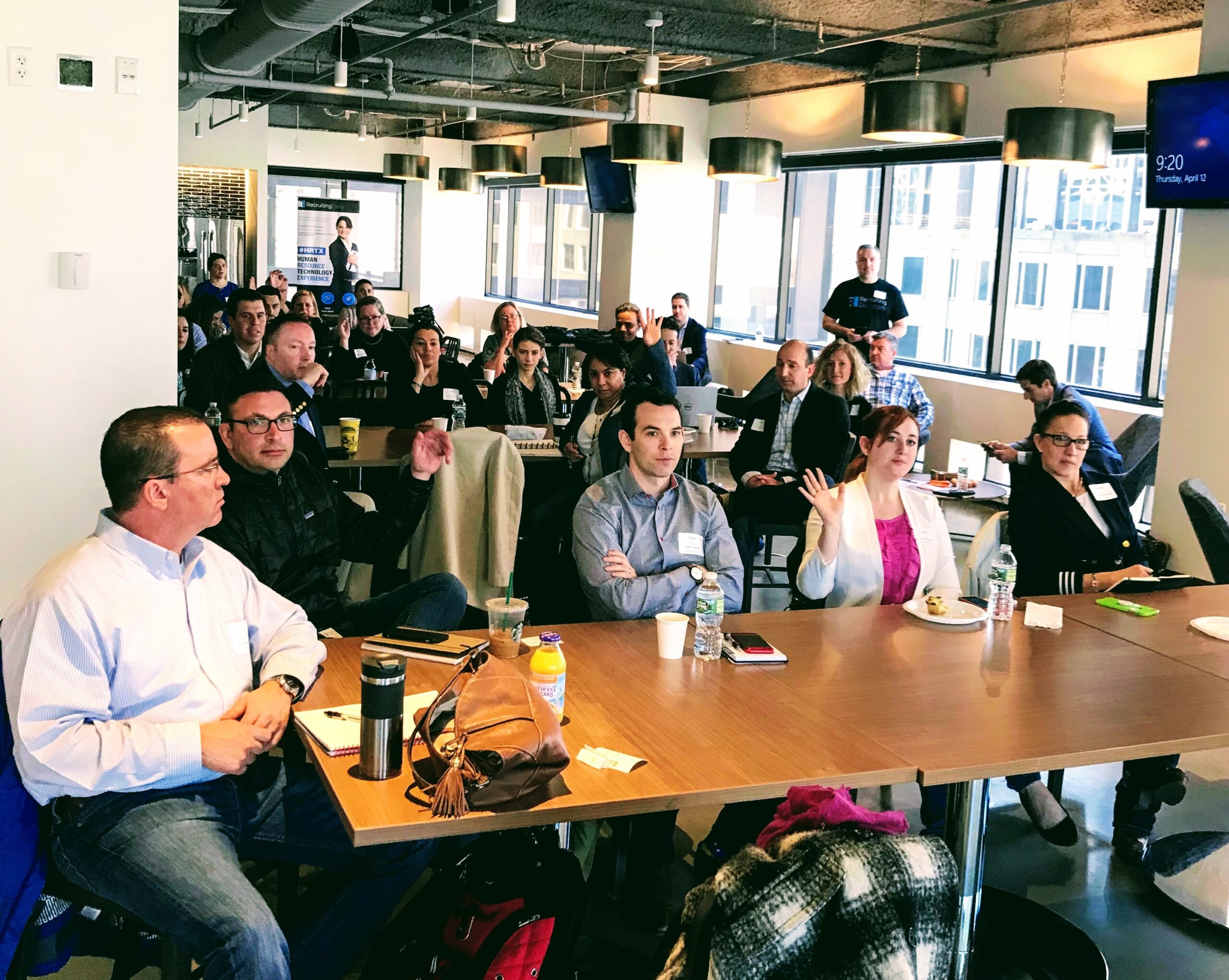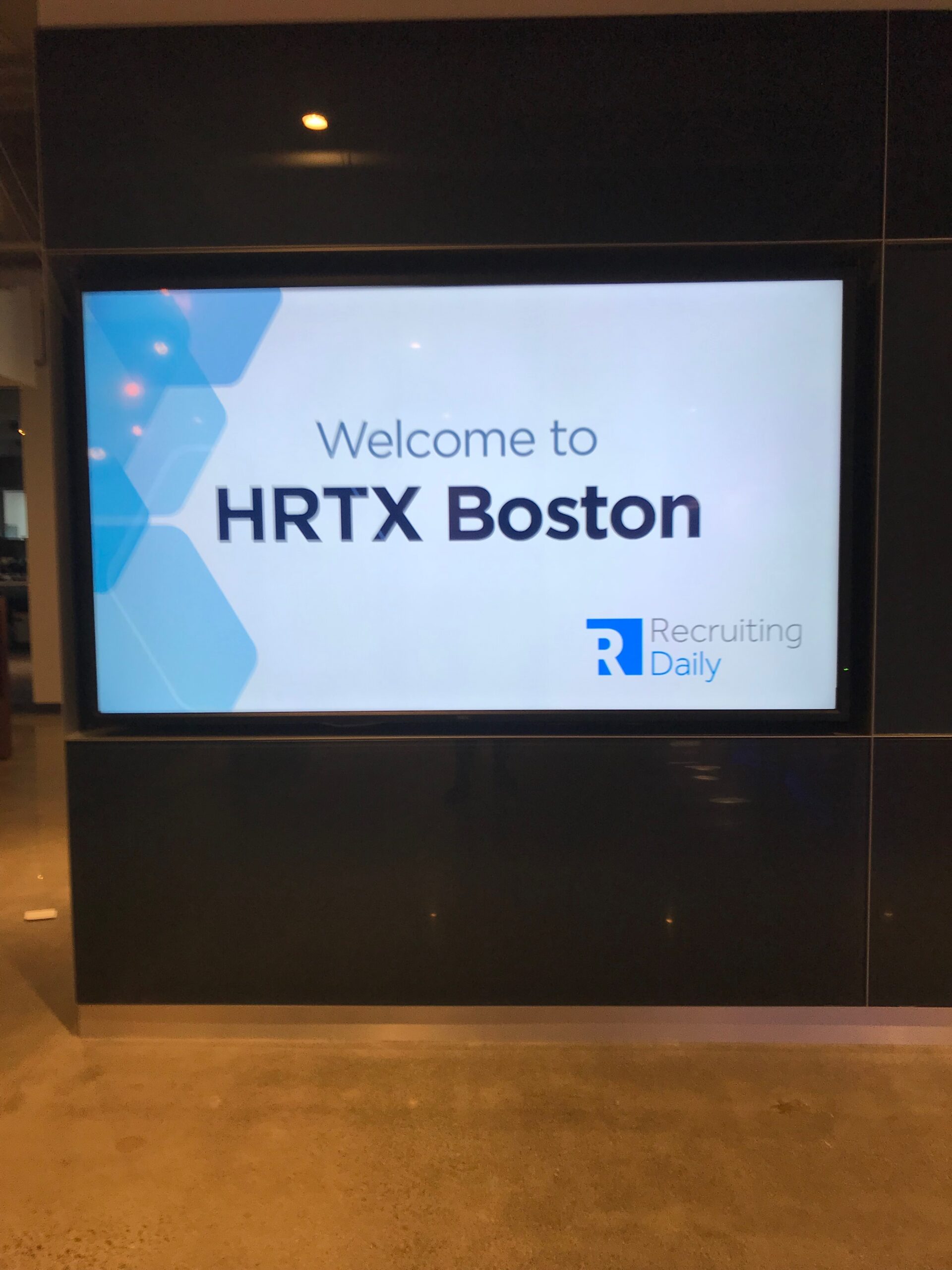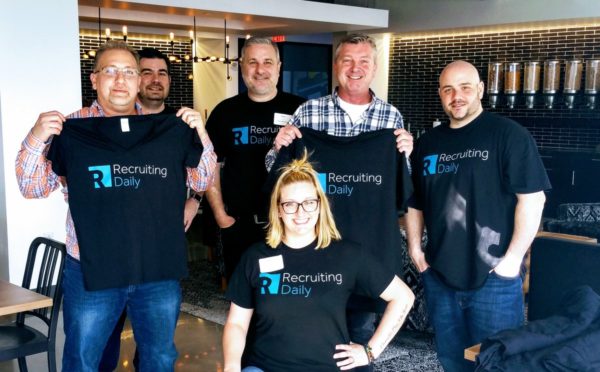
Automation and artificial intelligence, diversity, and inclusion, and Millennials and Generation Z were three of the hottest topics discussed at RecruitingDaily’s #HRTX Boston 2018 last week.
Hosted at staffing and recruiting technology provider Bullhorn’s global headquarters in Boston on April 12th, #HRTX Boston 2018 brought together more than 50 local TA, HR, staffing and recruiting professionals to examine the industry’s biggest challenges and opportunities.
The casual unconference event began with a live presentation by Raytheon’s Holly Mallowes. Holly opened her laptop showing real time how to recruit and source using the latest tools in today’s digital age before attendees broke into four discussion groups for the rest of the day.
Keeping the conversations going guests rotate between four stations, the groups along with track leaders openly chat about some of the biggest obstacles they’re facing in recruiting and discussed how technology can increase their productivity, efficiency, and operations.
As an employee of Bullhorn, I couldn’t pass up the opportunity to participate in the conversation for the second year in a row. My biggest takeaways from #HRTX Boston 2018 were that…
Automation and Artificial Intelligence Won’t Eliminate Recruiters’ Jobs
We constantly hear that robots will decimate our jobs, but is there any validity to that statement?
We all can imagine robots overtaking humanity, courtesy of Hollywood, but in recruiting, automation and artificial intelligence will actually help recruiting professionals to become more efficient at their jobs. Automation and artificial intelligence will aid firms through process improvements – like undertaking lower-level initiatives such as scheduling, screening, following up, and data entry. (Top of funnel, in other words.)
According to Bullhorn’s “2018 North American Staffing & Recruiting Trends Report: The Industry’s Outlook for 2018,” 40 percent of staffing and recruiting firms attribute automation’s greatest value to increased efficiencies. Recruiting professionals will then have more time to focus on higher-level initiatives such as deepening their candidate and client relationships. Proactive recruiting — where you have people ready when the salary band is there to open the position — might become more normative.
There’s no sweat about automation and artificial intelligence replacing human recruiters – it could never happen because automation and artificial intelligence can’t convey the same emotional intelligence that humans can to advance conversations forward.
Recruiting Diverse and Inclusive Talent Is a Priority, But More Work Needs to Be Done
Without a diverse and inclusive workforce, our creativity and innovation stifles; therefore, it’s incredibly important to remain focused on increasing efforts around diversity and inclusion.
But how should recruiters navigate these tricky waters, and what are some strategies that they can use to generate better results for diversity and inclusion?
According to some #HRTX attendees, diversity and inclusion need to be a top-down approach – CEOs need to be completely supportive of it and must champion it throughout their workplace. #HRTX attendees believe that companies need to ensure that unconscious bias doesn’t occur in their workplaces, so it’s imperative to train – and then retrain – managers on it.
They also say that establishing employee referral groups can further help recruit more diverse and inclusive talent.
Sourcing Millennial and Generation Z Candidates Requires New Recruiting Strategies
Recruiting the next-generation of talent is both exciting and challenging.
Exciting because this talent pool represents new ideas that can grow businesses to never-before-seen levels.
Challenging because this group demands new recruiting strategies to reach them, including communication.
Text messaging is the fastest-growing communication channel in 2018 for staffing and recruiting professionals, with 69 percent of firms expecting their usage to increase – especially in communicating with Millennial and Generation Z candidates, according to Bullhorn. Text messaging allows recruiting professionals to develop strong relationships with candidates because they’re connecting with them on their most personal devices – their mobile phones.
Recruiting on college campuses can also present challenges because there’s a greater pool of candidates immediately available. To hire the best talent from this pool, #HRTX attendees believe that sourcing talent based on the greatest skills needed for specific jobs is the fastest way to do so.
Go to one of these events
 If you’re a recruiting professional who’s looking to shape the future of the industry, #HRTX is the venue for you. Bullhorn is proud to have hosted #HRTX Boston for the second year in a row, and we’re looking forward to continuing the conversation with the greater recruiting community at future #HRTX events. It’s certainly an exciting, yet challenging, time in recruiting.
If you’re a recruiting professional who’s looking to shape the future of the industry, #HRTX is the venue for you. Bullhorn is proud to have hosted #HRTX Boston for the second year in a row, and we’re looking forward to continuing the conversation with the greater recruiting community at future #HRTX events. It’s certainly an exciting, yet challenging, time in recruiting.
For those of you not in Boston, there’s an #HRTX event coming to a city near you.
Enjoy the conversation!
Authors
Media Relations Manager for Bullhorn. Experienced communications manager, specializing in media strategy and pitching news to tier-one press and developing relationships/working with top-tier media. Secured client coverage in outlets such as ABC World News, ABC News Radio, Associated Press, Christian Science Monitor, CNN, CBSNews.com, Forbes, Fortune, Fast Company, NBCNews.com, The Wall Street Journal, The Washington Post, Time, TechCrunch, USA Today and VentureBeat. A former print journalist with experience in broadcast, Internet, and multimedia storytelling.
Recruit Smarter
Weekly news and industry insights delivered straight to your inbox.





